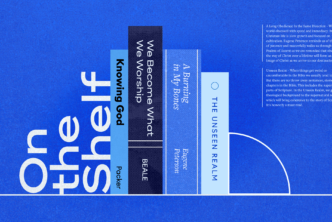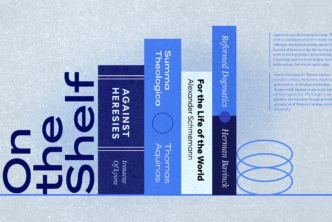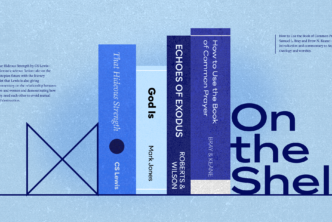What happens when a scholar dies in the middle of writing a New Testament commentary?
Lexham Press’s Scott Corbin talked with New Testament scholar and Regent College (Vancouver, BC) professor George Guthrie about the well-loved Osborne Commentary series—and about the Hebrews commentary he recently finished.
What was it like to finish the Hebrews commentary that was begun by your late friend, Grant Osborne?
As you can imagine, it was bittersweet. Being chosen by Grant himself to finish the commentary was a very great honor, and it was pure joy to “hear his voice” as I interacted with what he had already written. Yet death, though a door to Christ’s presence, is still an enemy, and the Church has lost a gift in Grant’s keen insight, his scholarship, his integrity as a disciple of Christ, and his heart for the Church.
What do you hope is Grant Osborne’s legacy?
Actually, I celebrate his legacy rather than hope for it, since that legacy—Grant’s impact for the cause of Christ—is already a living reality in the world. Grant has had a very great impact on younger brother and sister scholars who continue to do good work. As a gifted teacher, he taught countless pastors, laypeople, and missionaries through decades of faithful service at Trinity Evangelical Divinity School and elsewhere. Grant was instrumental in the founding of a major ministry to house-church pastors in Asia, which continues to this day and is shaping the Church significantly in that part of the world. And, of course, his scholarship has been embodied in the form of published books like this commentary on Hebrews.
What is one of your favorite memories of Grant Osborne?
In my preface to the Hebrews volume, I tell of a moment when I had recently arrived at Trinity. Grant and I had met but didn’t really know each other yet. We both were doing research in the library and found ourselves sitting side by side at a table, each looking for resources in New Testament Abstracts (you had to use the physical volumes in those days—no digital access!).
With a big smile Grant turned and said something to the effect, “I can’t think of anything better than this!” I smiled back and responded, “Well, I can think of a few things!” He laughed out loud, and our friendship took off from there. He was a delight, and one of the warmest, most accessible, most encouraging individuals I have ever met.
What is unique about the Osborne Commentary series?
I think that the commentary combines a depth of reflection with readability. As I interacted with the existing manuscript, the richness of the book of Hebrews itself came through; Grant was a gifted interpreter of the biblical text. Yet the commentary is wonderfully readable and practical. One of the things that makes this commentary especially unique is that Grant knew that he would soon be with the Lord, and you can hear that in his “voice” as he commented on particular passages, especially those dealing with “longing for a heavenly city.” His moment in life makes his comments on the text especially poignant.
Was there any place where you disagreed with Grant?
Of course, no two New Testament scholars will understand a book and all its parts in exactly the same ways. Yet, with this [Hebrews] volume I felt my role was that of a steward more than an interlocutor. If someone wants to hear my particular take on issues in Hebrews, I have written a number of other books and articles that can be accessed easily. For instance, Grant and I do not approach how to teach the book’s structure in the same way. Yet, I felt it most appropriate for me to simply work with and try to elucidate the structure he had developed. I believe that this ended up giving the commentary a sense of integrity.
How would you encourage readers to use this Hebrews commentary?
With the text of Hebrews in hand! They should read the text of Hebrews itself over and over again as they use the commentary. Grant would be the first to say that he would want his commentary to be a tool used to engage the text of Scripture, not a replacement for personal reading and study of the text of Scripture.
What is the most difficult passage to interpret in Hebrews?
From a theological standpoint, I think that Hebrews 4:1–11 on the “Sabbath rest” is challenging, since the author does not clearly define that rest and what it involves. I actually think that he has in mind a “Day of Atonement” rest that begins when a person enters the new covenant and is consummated at the end of the age. Yet, it takes a good deal of work to get to that conclusion!
From a ministry standpoint, the warning passages on apostasy, found in Hebrews 6:4–8 and 10:26–31, prove very challenging for many people. Through the years I have been contacted by dozens of people from around the world, who believe that they may have committed the unpardonable sin and are eaten up with anxiety. Helping them to hear what Hebrews is and isn’t saying, pointing them to hope in the gospel, can be very challenging.
What is your favorite passage in Hebrews?
That is kind of like asking me which of my children I prefer! I am not sure whether I would choose the introduction (1:1–4), which Ceslas Spicq called the most beautiful sentence in the New Testament, or the incredible transition passage, which forms the “front door” for the high priestly Christology in the great center section of Hebrews (4:14–16), or the climax of the discourse found in the contrast of two mountains (Heb 12:18–24). Like my own children, each is amazing in its own way! Yet, each points us to clarity on the identity and work of Christ, which lays the foundation for endurance in the faith.
What do you love the most about Hebrews?
In Hebrews, craft is brought to bear beautifully to encourage the Church and glorify Christ. I am still amazed at the tremendously high level of expertise the author wields in shaping this book. He had very advanced training in Greco‐Roman rhetoric as well as in rabbinic interpretation and argument. The Greek of the book is the best in the New Testament, with the exception, perhaps, of Luke’s writings. Such skill results in a beauty and depth of theological reflection, and it is brought to bear very practically for the sake of ministry to those struggling in the faith.
So I love the crafting of this book, and I am as excited about Hebrews as I was thirty‐five years ago when I started PhD work. My hope is that Grant Osborne’s commentary on Hebrews will draw many people into both the joy of discovering the richness of God’s word and into practical help for Christian living.
This excerpt about the Osborne Hebrews commentary was adapted from the original article in the September/October 2021 issue of Bible Study Magazine.
***
In Hebrews Verse by Verse, the late Grant R. Osborne, with George H. Guthrie, shows readers how this beautifully crafted letter encourages believers to endure in faithfulness to Jesus. By using Scripture and theology to lay the foundation for these exhortations, the central message of Hebrews continues to be relevant for the Church today.





